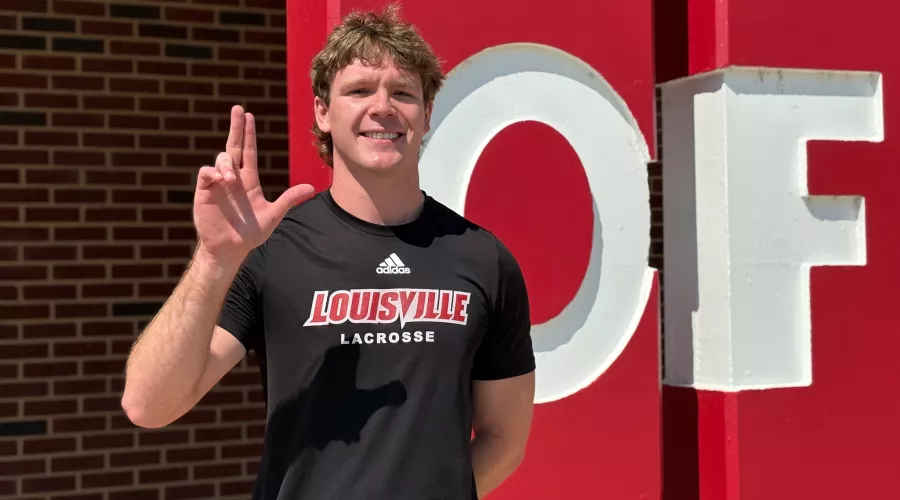History in Action: Undergraduate Research Examines Louisville’s Role in Global Justice Movement
August 4, 2025
By Stephanie Godward, Communications and Marketing Director, College of Arts & Sciences
Ben Coyle’s historical research on anti-apartheid activism in Louisville inspires him to continue a local legacy of speaking out against injustices for the sake of humanity; which is something that he says all Louisvillians can be proud of.
“With apartheid specifically, activists back then could have said, ‘That's in South Africa, so it’s not relevant to me; it doesn’t affect me.’ But they felt, by the virtue of knowing other human beings were being impacted, that those people matter as much as they do. And they felt compelled to speak out about the injustices whether it affected them or not.”
A history major and lacrosse player projected to graduate in December 2026, Coyle participated in UofL’s Summer Research Opportunity Program in partnership with the Anne Braden Institute. Tyler Fleming, History and Pan-African Studies Associate Professor, served as his mentor. Coyle chose this topic to delve into a specific aspect of Louisville’s history – researching religious activists in the city who fought against apartheid in South Africa.
“Louisville has a rich history of activism, and it encourages people to continue to have that voice fighting against injustices and to continue to be activists, and that is what I thought was really important,” Coyle said. “I am from Versailles and it’s a very rural area, so I was not exposed to a ton of activism as a young kid. But once I got to Louisville, specifically in the past few years with the Black Lives Matter movement – continuing that history and showing people that this is a huge part of Louisville’s culture – it's a continuation of that and shows people it’s always been a part of Louisville.”
This research is a continuation of ABI’s ongoing documentation of the anti-apartheid movement that occurred in Louisville in response to the racial segregation in South Africa that spanned from 1948 to 1994. That research began last summer, focusing on students’ anti-apartheid activism.
Coyle has always been interested in history, with the initial spark occurring after he saw the Indiana Jones movies as a child.
“All throughout elementary, middle school, and high school, social studies and history were always my favorite classes to take even though I didn’t really know if I wanted that to be my future,” he said. “Once I got to UofL, I knew immediately. Just being around so many smart scholars of history was something that definitely continued my interest and grew my love for history, especially in an academic sense.”
Participating in the SROP over the last few months allowed Coyle to gain experience that undergraduates do not typically gain, which is a major benefit of the program.
“Dr. Fleming and I worked at different archives – the Filson Historical Society, UofL’s Special Collections and Archives – and we would take a list of things we wanted to see, get back to the archivist there, and they would help us out to find those resources and bring them to us,” Coyle said. “Some of our days would be 8 hours straight of just flipping through newspapers or photographs. We would take notes on the research we did, catalogue it and document it to eventually produce the product for the SROP showcase.”
A valuable lesson he learned is that conducting research does not always mean discovering something exciting at every turn. Sometimes, it can feel like searching for a “needle in a haystack.”
“Research takes a lot of patience. Going several hours at a time – it can be challenging,” Coyle said. “But the SROP talked about that in weekly meetings – taking care of your mental health and being able to balance that hard work with research, and being in the archives, and balancing things socially, and keeping a level head. That alone will be valuable to my future career.”
He also learned about the importance of expanding your scope of research or shrinking it, depending on the needs of the project. In his case with the SROP, his research unveiled a very specific focus on Louisville's religious community’s activism against South African apartheid, while capturing the essence of the movement on an international scale.
The networking opportunities and connections made have been another important aspect of his involvement in the SROP, gaining invaluable insights from his mentor, Fleming, along with Paul DeMarco, Psychological and Brain Sciences Professor and Director of the Office of Undergraduate Research and Creative Activity.
Coyle hopes to pursue a career as a history professor and as a lacrosse coach in the future.
“Research is an experience that a lot of students don’t have the opportunity to get until graduate school or later years of undergrad, so it’s valuable to get that research under your belt and also looks great on a resume,” Coyle said. “You'll meet a lot of amazing people outside of your field as well which can really help you to grow your career.”
Related News



